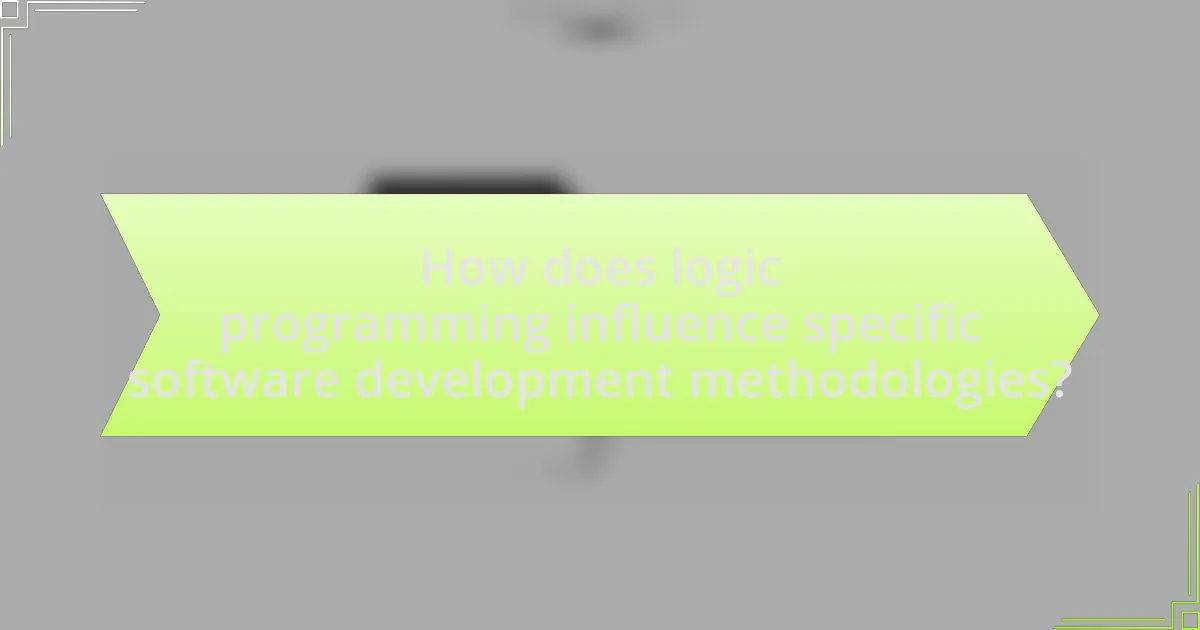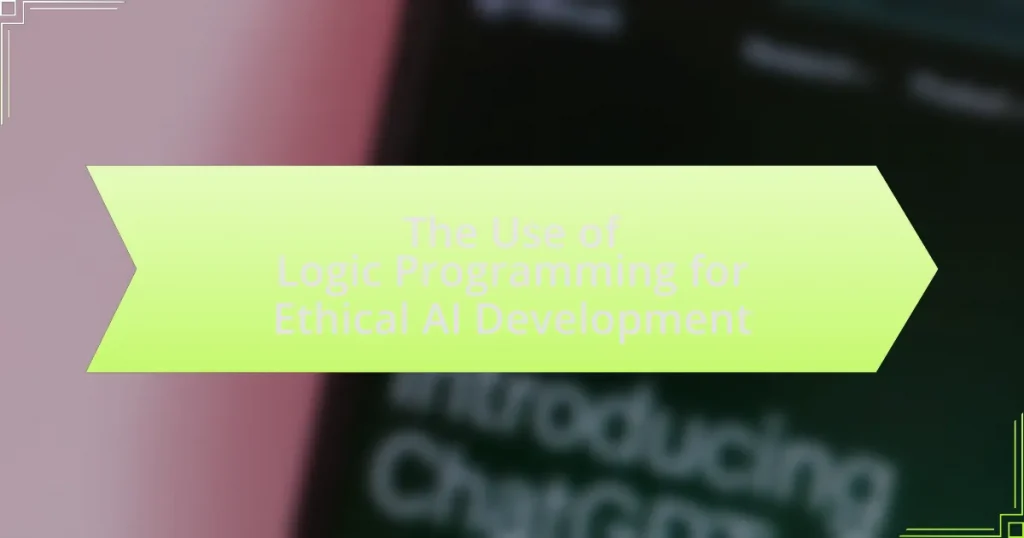Logic programming is a programming paradigm that plays a significant role in software development methodologies by enabling declarative problem-solving and automated reasoning. This article explores how logic programming integrates with traditional methodologies such as Agile and Waterfall, highlighting its principles like declarative programming and non-procedural abstraction that enhance code maintainability and readability. It discusses the advantages of logic programming, including improved problem-solving capabilities and its applications in artificial intelligence, natural language processing, and database management. Additionally, the article addresses the challenges of integrating logic programming into Agile practices and its impact on collaboration between development and operations teams, providing insights into best practices and recommended tools for effective implementation.

What is the Role of Logic Programming in Software Development Methodologies?
Logic programming plays a crucial role in software development methodologies by enabling declarative problem-solving and facilitating automated reasoning. This programming paradigm allows developers to express logic in terms of relations and rules, which can be directly translated into executable code. For instance, Prolog, a prominent logic programming language, is widely used in artificial intelligence and computational linguistics, demonstrating its effectiveness in handling complex queries and knowledge representation. The ability to define problems in a high-level, abstract manner enhances productivity and reduces the likelihood of errors, as seen in projects that leverage logic programming for tasks such as constraint satisfaction and natural language processing.
How does logic programming integrate with traditional software development methodologies?
Logic programming integrates with traditional software development methodologies by providing a declarative approach that complements imperative programming styles. This integration allows developers to express complex problems in terms of relationships and rules, which can enhance clarity and reduce the likelihood of errors. For instance, in methodologies like Agile or Waterfall, logic programming can be used for tasks such as automated reasoning, constraint satisfaction, and knowledge representation, which streamline the development process. The use of Prolog, a prominent logic programming language, has been shown to improve problem-solving efficiency in various applications, demonstrating its practical benefits in traditional software development contexts.
What are the key principles of logic programming that influence software development?
The key principles of logic programming that influence software development include declarative programming, non-procedural abstraction, and the use of formal logic for problem-solving. Declarative programming allows developers to specify what the program should accomplish without detailing how to achieve it, which simplifies code maintenance and enhances readability. Non-procedural abstraction enables programmers to focus on high-level problem statements rather than low-level implementation details, promoting a clearer understanding of the problem domain. The use of formal logic, particularly in languages like Prolog, facilitates reasoning about program behavior and correctness, which can lead to more reliable software systems. These principles collectively contribute to more efficient development processes and improved software quality.
How does logic programming differ from other programming paradigms in software development?
Logic programming differs from other programming paradigms by emphasizing the use of formal logic to express computations, primarily through rules and facts rather than imperative commands. In logic programming, such as in Prolog, the programmer defines relationships and constraints, allowing the system to infer solutions through a process of logical deduction. This contrasts with imperative programming, where the focus is on explicitly detailing the steps to achieve a result, and object-oriented programming, which centers around encapsulating data and behavior within objects. The unique approach of logic programming enables automatic backtracking and unification, facilitating problem-solving in domains like artificial intelligence and knowledge representation, where traditional paradigms may struggle.
What are the advantages of using logic programming in software development?
Logic programming offers several advantages in software development, including enhanced problem-solving capabilities, improved code maintainability, and increased productivity. By using a declarative approach, logic programming allows developers to focus on the “what” rather than the “how,” which simplifies the coding process. This paradigm enables the expression of complex relationships and rules succinctly, making it easier to reason about the code. Furthermore, logic programming languages, such as Prolog, facilitate automatic backtracking and pattern matching, which can lead to more efficient solutions for certain types of problems, particularly in artificial intelligence and database querying. These features contribute to reduced development time and lower maintenance costs, as logic-based systems can be more easily modified and extended compared to imperative programming approaches.
How does logic programming enhance problem-solving capabilities in software projects?
Logic programming enhances problem-solving capabilities in software projects by enabling declarative problem formulation, which allows developers to specify what the solution should achieve rather than how to achieve it. This approach simplifies complex problem-solving by focusing on relationships and constraints, making it easier to reason about the problem domain. For instance, Prolog, a prominent logic programming language, allows for concise representation of knowledge and rules, facilitating automated reasoning and inference. Studies have shown that projects utilizing logic programming can reduce development time and improve maintainability due to the clarity and expressiveness of the code, as evidenced by its application in artificial intelligence and database querying.
What impact does logic programming have on code maintainability and readability?
Logic programming significantly enhances code maintainability and readability by promoting declarative programming paradigms that focus on what the program should accomplish rather than how to achieve it. This approach allows developers to express complex logic succinctly, making the code easier to understand and modify. For instance, Prolog, a well-known logic programming language, enables the representation of knowledge in a way that is closer to human reasoning, which can simplify debugging and updates. Studies have shown that code written in logic programming languages can reduce the lines of code needed to implement functionality, thereby decreasing the potential for errors and improving overall maintainability.

How does logic programming influence specific software development methodologies?
Logic programming significantly influences software development methodologies by promoting declarative programming paradigms that enhance problem-solving and reasoning capabilities. This influence is evident in methodologies such as Agile and Model-Driven Development, where logic programming facilitates rapid prototyping and iterative development through its ability to express complex relationships and constraints succinctly. For instance, Prolog, a prominent logic programming language, allows developers to define rules and facts, enabling automated reasoning that can streamline decision-making processes in software design. Additionally, the use of logic programming in formal verification ensures that software adheres to specified requirements, thereby improving reliability and reducing bugs. This integration of logic programming into various methodologies demonstrates its critical role in advancing software development practices.
What role does logic programming play in Agile methodologies?
Logic programming plays a significant role in Agile methodologies by enhancing problem-solving capabilities and facilitating rapid prototyping. In Agile environments, where adaptability and iterative development are crucial, logic programming allows teams to define complex rules and relationships succinctly, enabling quick adjustments to changing requirements. For instance, Prolog, a prominent logic programming language, supports declarative programming, which aligns well with Agile principles by allowing developers to focus on what needs to be accomplished rather than how to implement it. This approach fosters collaboration among team members, as the logic can be easily understood and modified, thus promoting continuous integration and delivery, key tenets of Agile methodologies.
How can logic programming facilitate rapid prototyping in Agile projects?
Logic programming facilitates rapid prototyping in Agile projects by enabling the quick formulation and testing of complex rules and relationships within a system. This approach allows developers to define the desired outcomes declaratively, which can lead to faster iterations and adjustments based on stakeholder feedback. For instance, languages like Prolog allow for the rapid development of prototypes that can be easily modified to reflect changing requirements, thus aligning with Agile principles of flexibility and responsiveness. Additionally, the inherent ability of logic programming to handle non-linear problem-solving can streamline the prototyping process, reducing the time needed to validate concepts and features.
What are the challenges of integrating logic programming into Agile practices?
Integrating logic programming into Agile practices presents several challenges, primarily due to the inherent differences in their methodologies. Logic programming emphasizes formal reasoning and declarative problem-solving, which can conflict with Agile’s iterative and flexible approach. For instance, Agile prioritizes rapid development and adaptability, while logic programming often requires a more structured and upfront specification of rules and relationships, potentially slowing down the development process.
Additionally, the skill set required for logic programming may not align with the typical Agile team composition, which often focuses on object-oriented or procedural programming skills. This mismatch can lead to difficulties in team collaboration and knowledge sharing. Furthermore, integrating logic programming tools and frameworks into existing Agile workflows can introduce complexity, as teams may need to adapt their processes to accommodate the unique requirements of logic-based systems. These challenges highlight the need for careful planning and training when attempting to merge these two approaches effectively.
How is logic programming applied in DevOps practices?
Logic programming is applied in DevOps practices primarily through automation and configuration management. By utilizing logic programming languages like Prolog, teams can define rules and relationships that automate deployment processes, ensuring consistency and reducing human error. For instance, logic programming can facilitate the creation of complex deployment scripts that adapt based on the current state of the system, allowing for dynamic resource allocation and efficient scaling. This application enhances collaboration between development and operations teams by providing a clear, rule-based framework for managing infrastructure as code, which is essential in modern DevOps environments.
What benefits does logic programming bring to continuous integration and deployment?
Logic programming enhances continuous integration and deployment by enabling automated reasoning and verification of code correctness. This approach allows for the specification of rules and relationships within the code, facilitating the detection of inconsistencies and errors early in the development process. For instance, Prolog, a well-known logic programming language, can be used to express complex business rules that can be automatically checked against the codebase, ensuring compliance and reducing the likelihood of defects. Additionally, logic programming supports the creation of declarative specifications, which can simplify the integration of various components by clearly defining their interactions, thus streamlining deployment processes.
How can logic programming improve collaboration between development and operations teams?
Logic programming can improve collaboration between development and operations teams by providing a clear framework for defining rules and relationships within complex systems. This structured approach allows both teams to share a common understanding of system behavior, facilitating better communication and reducing misunderstandings. For instance, using logic programming languages like Prolog enables teams to express system requirements and constraints in a formalized manner, which can be easily interpreted by both developers and operations personnel. This clarity leads to more efficient problem-solving and decision-making processes, ultimately enhancing the overall collaboration between the two teams.

What are the practical applications of logic programming in software development?
Logic programming has practical applications in software development, particularly in areas such as artificial intelligence, natural language processing, and database management. In artificial intelligence, logic programming enables the creation of systems that can reason and make decisions based on rules and facts, exemplified by Prolog, which is widely used for developing expert systems. In natural language processing, logic programming facilitates the parsing and understanding of human languages, allowing for the development of chatbots and language translation tools. Additionally, in database management, logic programming supports query languages like Datalog, which allows for efficient data retrieval and manipulation based on logical rules. These applications demonstrate the effectiveness of logic programming in solving complex problems and enhancing software functionality.
How is logic programming used in artificial intelligence and machine learning?
Logic programming is utilized in artificial intelligence and machine learning primarily for knowledge representation and reasoning. This paradigm allows for the formalization of rules and relationships, enabling systems to infer conclusions from given facts. For instance, Prolog, a prominent logic programming language, is often employed in AI applications for tasks such as natural language processing and expert systems, where logical rules can be used to derive new information from existing data. The effectiveness of logic programming in these domains is evidenced by its ability to handle complex queries and perform automated reasoning, which are essential for developing intelligent systems that can learn and adapt.
What specific tasks in AI benefit from logic programming techniques?
Logic programming techniques benefit specific tasks in AI such as knowledge representation, automated reasoning, and natural language processing. Knowledge representation utilizes logic programming to encode facts and rules about the world, enabling systems to infer new information. Automated reasoning employs these techniques to derive conclusions from known facts, facilitating problem-solving in domains like theorem proving and expert systems. In natural language processing, logic programming aids in parsing and understanding language structures, allowing for more effective communication between humans and machines. These applications demonstrate the effectiveness of logic programming in enhancing AI capabilities.
How does logic programming support knowledge representation in AI systems?
Logic programming supports knowledge representation in AI systems by providing a formal framework for defining and manipulating knowledge through logical statements. This framework allows for the representation of facts and rules in a way that can be easily processed by computers, enabling automated reasoning and inference. For example, Prolog, a prominent logic programming language, uses a set of logical clauses to represent knowledge, allowing systems to derive new information from existing data through backtracking and unification. This capability is essential in AI applications such as expert systems, where complex decision-making relies on the ability to represent and reason about knowledge effectively.
What are the best practices for implementing logic programming in software projects?
The best practices for implementing logic programming in software projects include defining clear problem specifications, utilizing modular design, and ensuring thorough testing. Clear problem specifications help in accurately modeling the logic needed for solutions, which is essential in logic programming. Modular design allows for the separation of concerns, making it easier to manage and debug code. Thorough testing, including unit tests and integration tests, ensures that the logic behaves as expected under various conditions. These practices enhance maintainability and reliability, which are critical in software development.
How can teams effectively train members in logic programming concepts?
Teams can effectively train members in logic programming concepts by implementing structured learning paths that include hands-on projects, collaborative coding sessions, and regular assessments. Structured learning paths ensure that all members progress through foundational topics before advancing to complex concepts, which is essential for grasping logic programming’s unique paradigms. Hands-on projects allow team members to apply theoretical knowledge in practical scenarios, reinforcing their understanding through real-world applications. Collaborative coding sessions foster peer learning and knowledge sharing, which enhances problem-solving skills and encourages diverse approaches to logic programming challenges. Regular assessments, such as quizzes and coding challenges, provide feedback on individual progress and identify areas needing improvement, ensuring that all team members achieve a solid understanding of logic programming concepts.
What tools and frameworks are recommended for logic programming in software development?
Prolog and Mercury are two recommended tools for logic programming in software development. Prolog is widely used for its powerful pattern matching and backtracking capabilities, making it suitable for tasks such as natural language processing and artificial intelligence. Mercury, on the other hand, offers a more modern approach with strong typing and mode systems, enhancing performance and reliability in logic programming tasks. Both tools have been validated through extensive use in academic and industrial applications, demonstrating their effectiveness in solving complex problems through logical reasoning.



